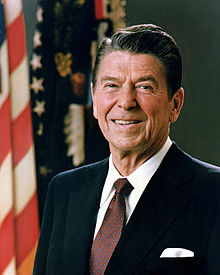So, it turns out that greed isn't good after all -- at least not for the vast majority of the American people. But this is a lesson that many U.S. opinion leaders still resist.
For the past three decades -- since Ronald Reagan's Republican landslide in 1980 -- the United States has undertaken arguably the most destructive social experiment in American history, the incentivizing of greed among the rich by halving their top marginal tax rates.
The idea -- once famously sketched out by right-wing economist Arthur Laffer on a napkin -- was to slash the tax rates on the rich to spur a "supply side" bonanza of economic growth and higher tax revenues for the government.
Before becoming Reagan's vice presidential running mate, George H.W. Bush labeled this tax strategy "voodoo economics," and Reagan's first budget director David Stockman warned that, without severe spending cuts, it could create a sea of red ink as far as the eye could see.
But the experiment was undertaken anyway, with Reagan persuading a large swath of the American electorate -- especially alienated white men -- that tax cuts heavily weighted to the rich were the way to go and that the most important priority was to get rid of federal regulations, or as Reagan phrased it, "government is the problem."
Reagan's sharply lower tax rates meant that the rich had a much stronger incentive to pad their salaries and grab whatever they could.
Instead of the richest Americans paying 70 percent or more of the highest tranche of their income to the Treasury as they did in the 1960s and 1970s (it was even higher, 90 percent, under President Dwight Eisenhower in the 1950s), the rich saw Reagan reduce their marginal tax rates to 28 percent by 1988.
The tax bite on some millionaires could be even lower if their earnings were categorized as "capital gains," which were taxed at 15 percent. Over time, Republicans also eliminated the "estate tax" on large fortunes.
So, rather than discouraging excess wealth -- as had occurred under presidencies from Dwight Eisenhower and John F. Kennedy to Richard Nixon and Jimmy Carter -- Reagan essentially encouraged the rich to be greedy. Greed went from being a moral sin to a policy goal.
Gordon Gekko, the fictional corporate raider played by Michael Douglas in Oliver Stone's "Wall Street," summed up Reagan's new paradigm: "Greed, for lack of a better word, is good."
Consolidating an Orthodoxy
In the 1984 presidential campaign, Reagan and the Republicans turned their radical tax policies into a national orthodoxy when Democratic nominee Walter Mondale announced that he would raise taxes if elected and Reagan then mocked campaign hecklers with the smiling rejoinder, "I'll let Mondale raise your taxes."
When Mondale was crushed in Reagan's 1984 landslide, it became clear that the American electorate had bought into this theory that lower taxes would be good for all.
Reagan's Vice President George H.W. Bush followed the beloved "Gipper" in 1988 with a Reagan-like promise: "Read my lips: no new taxes."
Though Bush eventually retreated somewhat from his pledge, lifting the top tax rate to 31 percent in 1991 as part of a deficit-reduction deal with Democrats, Reagan's low-tax orthodoxy had settled in as a permanent feature of U.S. politics, despite the huge deficits that it created.
Even modest efforts to roll back Reagan's folly have proved costly to politicians. Many congressional Democrats went down to defeat in 1994 after they supported President Bill Clinton's boost in the top marginal rates from 31 percent to 39.6 percent.
(Note: You can view every article as one long page if you sign up as an Advocate Member, or higher).






